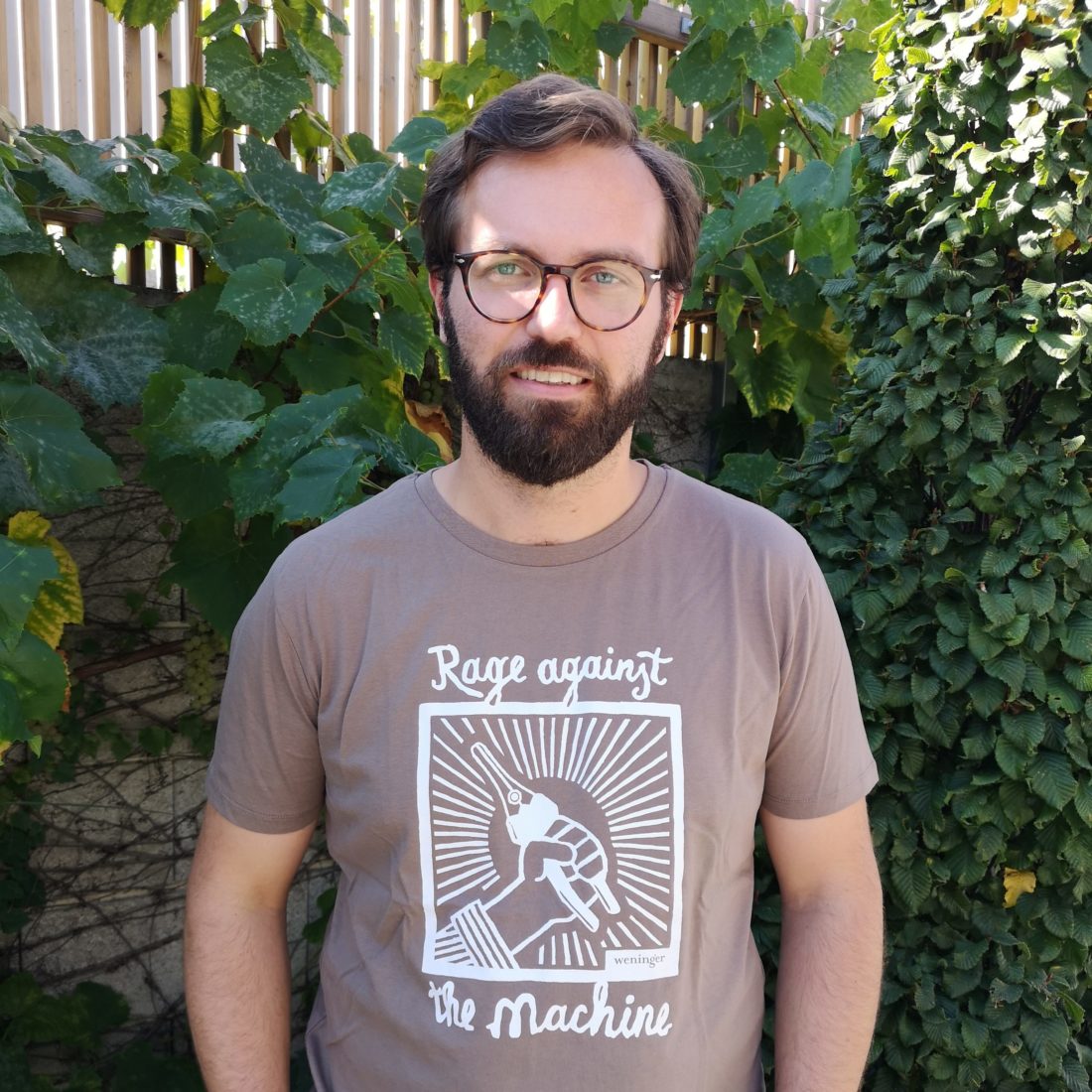Rage Against the Machine
Written by Franz Weninger on the 18th of September 2018After a robust Facebook discussion in the previous year, it became clear to me how I wanted my 2018 harvest t-shirt to look.

We are known for our commitment to hand-harvesting. Not out of a dogmatic attitude but out of respect for certain cultural aspects. Of course, we are also finding it more and more difficult to find the people needed for the task, but we will certainly never give up on hand-harvesting. There are a number of reasons that make it a must in our opinion.
- The Quality
In the aforementioned Facebook discussion, it quickly became clear to me that the quality issue would not help me to win the argument against the defenders of machine harvesting. It may well be that, thanks to the new generation of machine harvesters, the quality of the harvested grapes is no longer compromised, at least at first sight. But there is much more at stake. Here is a significant example: At school, when my son was taking part in a class project about viticulture, the machine harvester was depicted as the future, whereas hand-picking was classified as a thing of the past – outdated and obsolete.
The reality in our region speaks volumes: in Deutschkreutz there are definitely more than 10 machines operational and also in Horitschon, more than half of all wineries are said to harvest mechanically nowadays. My arguments against the knocking or shaking of vines also led to a dead-end. Of course, looking at it this way, many of the wine farmer’s interventions, such as the removal of leaves and shoots, also hurt the vine. Here we can quickly see that even a biodynamic wine farmer is a guardian of culture and that these activities have little to do with nature. The term “natural wine” is equally misleading, but that’s another story. In the culture of wine farming, people do all sorts of things to improve the wine, but they also take into account the vine’s well-being. Simply because they plan to work with it for a long time.
Whenever you talk to wine makers, they always mention the soil – and this is a good thing. They talk about the character and flavour nuances that this or that soil type lends the wine; they talk about how they work, plant and care for the soil. Its significance cannot be overestimated and those who know me, know that the expression of the soil is more important to me than the grape variety, much as I love Blaufränkisch. Everyone keeps speaking about the soils, yet more and more often they drive over them with heavy machinery. How disastrous the effects of the consequent soil compaction are on the entire vineyard ecosystem cannot just be swept under the rug!

- The Culture
I remember it very well. As a child, I loved helping out with the harvest, because apart from the hard work (mostly in rubber boots, to defy the wet autumn weather), there was also a lot of chatter, and with the local pensioners telling stories there was never a dull moment. We drank “spritzers” or grape juice, we ate and we sat on benches in the vineyards. It’s no wonder: food brings people together. During harvest time, the vineyards were buzzing with activity and I like to imagine that they also loved this time of the year…
It is unnecessary to paint the opposite picture, but I think that everyone would agree that the ruckus alone of a machine harvester could never compare to the pleasant hustle and bustle of a group of people hand-picking.
- The Cultural Landscape and Free Farmers
Let’s for a moment think about agriculture and take another look into history. Isn’t it exactly the same situation with combine harvesters? In the past, there would be 100 workers with flails in the field, today they have all – with the exception of the driver – become obsolete. Before, it was possible to make a living in our region with 15 hectares of land; today a farmer needs 200 ha. And even then, he is degraded to a mere grant recipient and voting puppet of the political parties. This is not what a proud and free farmer looks like.
Today, we live and work in a sector of agriculture whose products are still of value. We as wine farmers are appreciated and our wines enjoy some renown – sometimes even internationally. But if we continue to increasingly industrialise viticulture, we will inevitably end up there where agriculture finds itself nowadays. The way we farm our vineyards will in the end not be determined by us, but by a directive, and so we will indirectly become employees of a system that is everything but sustainable and future-oriented. At that point, the past will indeed become better than the present…
This is why I am going to wear my RAGE AGAINST THE MACHINE harvest t-shirt with pride.
Buy a T-shirt, we ship now worldwide
Logo Design: Christoph Gratzer
In order to promote hand-harvesting in Austria, we have offered the design of the t-shirt free of charge to the affiliated wine makers (currently that includes Triebaumer, Wachter Wiesler, Claus Preisinger, Michael Gindl, Harmut Aubell, Weingut Rothe, Winkler-Hermaden, Anita & Hans Nittnaus, Schützenhof, Sattlerhof). All other wine makers are welcome to contact us.